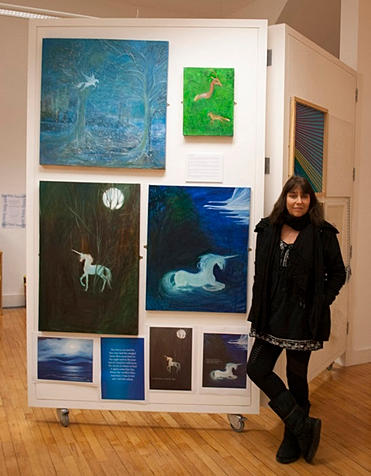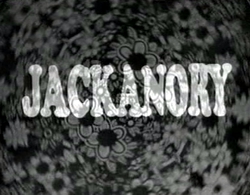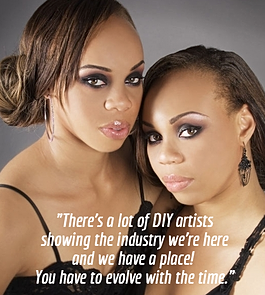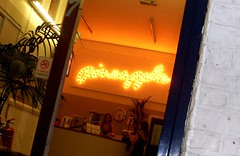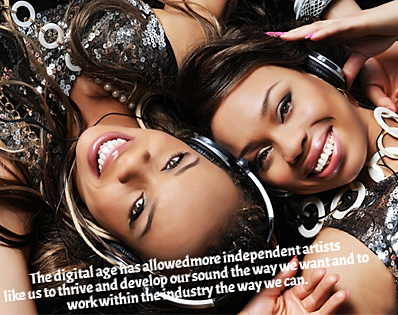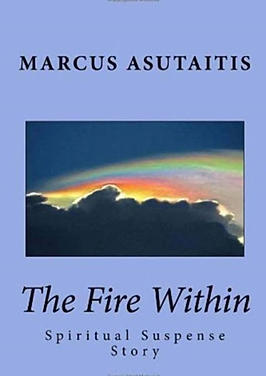Interview personality Damon Campbell has built a reputation for himself as the man to go to in Michigan if you are a musician. He focuses on the human essence of his subjects as well as their artistic integrity, which makes for compulsive viewing on his website MuzikzMyLife.Com. I wanted to allow our readers to discover how he did it.
SD: I love how music is your life. Did you ever want to make music, or did you watch music interviews and aspire to that career straight away?
DC: Thank you. I’ve always been interested in seeing quote unquote “celebrities” for the human beings that they are and learning about their life stories, so I grew up reading a lot of biography books about my favorite athletes and musicians and watching documentaries like VH1’s “Behind the Music,” even some of Sway’s interviews on MTV. But it definitely took a while for me to see interviewing, or even journalism as a whole, as a viable career choice for myself.
In terms of wanting to make music, not many people even know this about me, but there was actually a brief period of my life when I wanted to grow up to be a rapper. It was just a phase, though, and I eventually grew out of it. But I definitely spent a lot of time in 5th grade writing out the lyrics to my favorite rap songs and memorizing/reciting them, which ultimately lead to me performing “Number 1” by Nelly in front of all my classmates at the school talent show that year. Somewhere along the line, I started writing some songs of my own as well, but thankfully they never saw the light of day.
SD: Looking at your site, it looks like you present for your own website MuziksMyLife.com. Is this website how you established a name for yourself?
DC: Definitely. Ever since I realized that I wanted to make a career out of this, I’ve always sort of looked at my site as a public portfolio: all of my interviews, write-ups, and — to a certain extent —experiences in the music industry on full display for the world to see. Basically, my intentions with the site have always been to ultimately use it as a stepping stone to greater opportunities, once I’ve proven myself worthy of them.
SD: How long ago did you set up the site and did it begin as a music interview website?
DC: I started the site in 2007, when I was a junior in high school, as a way to help keep people up to date with the latest music because at the time, hip-hop blogs (and music blogs in general) weren’t nearly as common as they are today, and not many people even knew about the few that existed. Friends of mine were often asking me to update their iPods for them, so I saw it as a way to help people out on a larger scale. I was spending all my time on these other sites anyways, so one day I just decided to start one of my own, and I called it MuziksMyLife.
As things progressed, I eventually started doing interviews in 2010 as a way to contribute exclusive content to the culture, while also giving my viewers a chance to learn about certain artists and hopefully feel more connected to them as human beings. But for a while I just dabbled, even though I was becoming more and more known for it. I didn’t like the thought of being boxed in and felt like people were overlooking the fact that I could do other things too, so at the time I was still trying to expand my repertoire.
About a year and a half ago, however, I had somewhat of an epiphany. I finally realized that interviewing was what would not only take me the furthest in my career, but also where my passion and talent truly lied. So I decided to fully embrace the role by eliminating all distractions and focusing solely on conducting as many quality interviews as possible.
As things progressed, I eventually started doing interviews in 2010 as a way to contribute exclusive content to the culture, while also giving my viewers a chance to learn about certain artists and hopefully feel more connected to them as human beings. But for a while I just dabbled, even though I was becoming more and more known for it. I didn’t like the thought of being boxed in and felt like people were overlooking the fact that I could do other things too, so at the time I was still trying to expand my repertoire.
About a year and a half ago, however, I had somewhat of an epiphany. I finally realized that interviewing was what would not only take me the furthest in my career, but also where my passion and talent truly lied. So I decided to fully embrace the role by eliminating all distractions and focusing solely on conducting as many quality interviews as possible.
[youtube http://www.youtube.com/watch?v=Iy5Hvzwi4Uk]
SD: Was your first interview of a famous person? How did you achieve your first interview, and how did you achieve your first interview with an established person?
DC: I feel like ‘fame’ is a relative term, but the first interview I ever did was with a Miami-based rapper named Billy Blue, which was pretty surreal ‘cause his song Story of My Life was the summer anthem for my friends and I the year before. If memory serves me right, I think I got a hold of him over Twitter and he messaged me his manager’s number, who in turn helped me set up a phone call with the man himself that ended up lasting a whopping 26 minutes. That was the first time I realized what types of doors my site could open for me.
But the first time I felt like I had knocked a door down, so to speak, was when I interviewed Wiz Khalifa, and I credit that one in particular to persistence. It was only my third on-camera interview (fourth overall), so clearly I hadn’t established myself yet. Not only that, but “Black and Yellow” was already No. 7 on the Billboard Hot 100 well on its way to becoming No. 1.
Needless to say, the odds were stacked against me—so much so that I actually got ignored for like a week straight. But I knew deep down that I could make it worth their while, and that it would ultimately give me the credibility I needed to move forward, so I refused to accept defeat and was eventually able to convince Will, his manager, to give me a chance. From there, I knew that anything would be possible.
But the first time I felt like I had knocked a door down, so to speak, was when I interviewed Wiz Khalifa, and I credit that one in particular to persistence. It was only my third on-camera interview (fourth overall), so clearly I hadn’t established myself yet. Not only that, but “Black and Yellow” was already No. 7 on the Billboard Hot 100 well on its way to becoming No. 1.
Needless to say, the odds were stacked against me—so much so that I actually got ignored for like a week straight. But I knew deep down that I could make it worth their while, and that it would ultimately give me the credibility I needed to move forward, so I refused to accept defeat and was eventually able to convince Will, his manager, to give me a chance. From there, I knew that anything would be possible.
SD: How did you achieve your goals in terms of writing and interviewing? Does it help being based in Michigan?
DC: I had to learn to appreciate it, but I’ve definitely come to realize that being based in Michigan gives me a competitive advantage. For starters, I conduct the majority of my interviews when artists come through on tour, and it seems like almost every single tour makes at least one stop in Michigan, if not more. We have so many different markets — Detroit, Grand Rapids, Lansing, Ann Arbor, the list goes on — and each one has multiple venues varying in capacity, which allows for a wide range of talent to come here and perform. And when all else fails, I’m still only three hours from Chicago.
Not only that, but if I lived in a media hub like New York City then I’d be further down the totem pole and therefore less of a priority for artists seeking press coverage while in town. Whereas here in The Mitten, I feel like I’ve marked my territory in a sense and really established myself as the go-to guy for on-camera interviews—at least in hip-hop, anyway.
Over the years, I’ve also become increasingly familiar with different venues and their tendencies, built rapport with certain staff and security, etc. And since none of these interviews are ever truly guaranteed until they’re completed, it helps to know your way around in case you happen to find yourself in a pinch.
Not only that, but if I lived in a media hub like New York City then I’d be further down the totem pole and therefore less of a priority for artists seeking press coverage while in town. Whereas here in The Mitten, I feel like I’ve marked my territory in a sense and really established myself as the go-to guy for on-camera interviews—at least in hip-hop, anyway.
Over the years, I’ve also become increasingly familiar with different venues and their tendencies, built rapport with certain staff and security, etc. And since none of these interviews are ever truly guaranteed until they’re completed, it helps to know your way around in case you happen to find yourself in a pinch.
SD: Did you receive any help to get to your position? What tips would you give people trying to make a name for themselves?
DC: Oh, definitely. I mean, on the one hand I’m essentially a freelance journalist who just so happens to have his own platform, so it’s certainly an independent grind in the sense that I’ve had to create a lot of my own opportunities. But at the same time, I’d be foolish to think that I could have made it this far without all the people who’ve supported me over the years and ultimately contributed to my success—whether they even realize it or not. I try my best not to take anything for granted, so I could go on for days recalling certain situations and thanking those who’ve played a role up until this point. But to save on time I’d just like to say that this entire journey, much like life in general, has been about one thing leading to another. It all adds up.
Taking that into account, my advice to anyone reading this would be to try and live a regret-free life from this point forward. I know, easier said than done. But think about it: not only are you dwelling on the past, but you’re allowing its negativity to seep into your present. Sure, it can be beneficial to look back on things from time to time and learn from the direct consequences of certain decisions so that you can apply those experiences down the road if you so choose. But the fact of the matter is…even if you could go back in time and change something, it’s utterly impossible to know what type of outcome that would have on even the world in general, much less your own specific situation. It’s the butterfly effect, plain and simple. So there comes a point when dissecting your past only distracts you from your future.
Taking that into account, my advice to anyone reading this would be to try and live a regret-free life from this point forward. I know, easier said than done. But think about it: not only are you dwelling on the past, but you’re allowing its negativity to seep into your present. Sure, it can be beneficial to look back on things from time to time and learn from the direct consequences of certain decisions so that you can apply those experiences down the road if you so choose. But the fact of the matter is…even if you could go back in time and change something, it’s utterly impossible to know what type of outcome that would have on even the world in general, much less your own specific situation. It’s the butterfly effect, plain and simple. So there comes a point when dissecting your past only distracts you from your future.
SD: Would you consider yourself an artist? Or how would you describe yourself?
DC: Absolutely. I don’t go around referring to myself as an artist, per se. If someone asks, I’ll say I’m an interviewer or, at most, an interview personality. But if you really break it down, interviewing has become my outlet for creative expression. Just like any other art form, it’s my craft for others to critique, study, and — most of all — enjoy, and I take great pride in my work. I strive for all of my interviews to be the best that they can possibly be, and in the process, refuse to ever sacrifice their artistic integrity.
SD: Are you working 24/7 in your field to maintain a name for yourself?
DC: The last thing I would ever want to do is get caught up in the past and rest on my success, so I eat, sleep, and breathe this stuff. Not only to maintain a name for myself, knowing that all of this could be gone tomorrow if I allowed it to be, but more importantly to continue pushing the boundaries and building upon my accomplishments — always taking things to the next level.
As I mentioned earlier, I named my site MuziksMyLife because at the time, I was spending all of my free time listening to music and studying the game, trying to keep up with everything that was going on within the industry. But since then, music — and more specifically as of late, interviewing musicians — truly has become my life, 24/7. One of the things that I love most about what I do is that I don’t have time to be bored. Regardless of what it is, there’s always something productive that I can be doing to help further my career. Even when I am off doing something else, which is rare, I’m usually still multitasking or, at the very least, thinking about my musical endeavors.
As I mentioned earlier, I named my site MuziksMyLife because at the time, I was spending all of my free time listening to music and studying the game, trying to keep up with everything that was going on within the industry. But since then, music — and more specifically as of late, interviewing musicians — truly has become my life, 24/7. One of the things that I love most about what I do is that I don’t have time to be bored. Regardless of what it is, there’s always something productive that I can be doing to help further my career. Even when I am off doing something else, which is rare, I’m usually still multitasking or, at the very least, thinking about my musical endeavors.
SD: Is there anything else you’d like to add?
DC: I’d just like to thank you for taking the time out to interview me. I really appreciate the opportunity and can’t even begin to tell you how much I enjoyed your questions. I’d also like to thank anyone who took the time to read this. If you’re interested in watching any of my interviews, you can find them all on MuziksMyLife.com. My contact info is on there as well. Thanks again!
DC: I’d just like to thank you for taking the time out to interview me. I really appreciate the opportunity and can’t even begin to tell you how much I enjoyed your questions. I’d also like to thank anyone who took the time to read this. If you’re interested in watching any of my interviews, you can find them all on MuziksMyLife.com. My contact info is on there as well. Thanks again!

